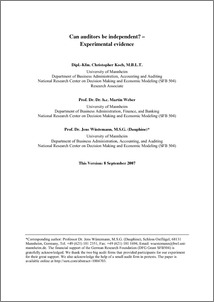|
Can auditors be independent? – Experimental evidence
Koch, Christopher
;
Weber, Martin
;
Wüstemann, Jens
![[img]](https://madoc.bib.uni-mannheim.de/style/images/fileicons/application_pdf.png)  Vorschau |
|
PDF
SSRN_ID1013051_code376713.pdf
- Veröffentlichte Version
Download (275kB)
|
|
URL:
|
https://ub-madoc.bib.uni-mannheim.de/1778
|
|
URN:
|
urn:nbn:de:bsz:180-madoc-17788
|
|
Dokumenttyp:
|
Arbeitspapier
|
|
Erscheinungsjahr:
|
2007
|
|
Titel einer Zeitschrift oder einer Reihe:
|
Working Papers
|
|
Band/Volume:
|
146
|
|
Ort der Veröffentlichung:
|
Mannheim
|
|
ISSN:
|
1869-0483 , 1869-0491
|
|
Sprache der Veröffentlichung:
|
Englisch
|
|
Einrichtung:
|
Fakultät für Betriebswirtschaftslehre > Sonstige - Fakultät für Betriebswirtschaftslehre
|
|
MADOC-Schriftenreihe:
|
Lehrstuhl für ABWL, Finanzwirtschaft, insb. Bankbetriebslehre (Weber) > Working Papers
|
|
Fachgebiet:
|
330 Wirtschaft
|
|
Fachklassifikation:
|
JEL:
M49 K22 G38 G34 C90 ,
|
|
Normierte Schlagwörter (SWD):
|
Rechenschaft , USA / Sarbanes-Oxley Act , Audit Committee , Jahresabschlussprüfung , Unabhängigkeit
|
|
Freie Schlagwörter (Englisch):
|
Accountability , Audit Committee , Auditor Independence , Client Retention Incentives , Experience , Professional Skepticism
|
|
Abstract:
|
In the U.S., the Sarbanes-Oxley Act made the audit committee responsible for the appointment, compensation and oversight of the auditor. We examine whether this institutional change resolves the alleged problem of an unconscious favoring of the management (Bazerman et al. 1997, 2002, 2006). In our experimental design, we make use of the particular features of the German institutional setting as it enables us to manipulate the client of the auditor in a realistic and clear-cut way. First, we find that auditors demonstrate professional scepticism in the evaluation of evidence while they issue unbiased audit opinions. Second, we confirm that perceiving financial incentives to be high may bias the audit opinion. Making the auditor accountable to a supervisory board proved helpful in reducing this risk. Third, we show that auditors who perceive the psychological incentives to be high tend to favor the judgment of the management. This effect disappears for experienced auditors.
|
|
Zusätzliche Informationen:
|
Available at SSRN: http://ssrn.com/abstract
|
 | Dieser Eintrag ist Teil der Universitätsbibliographie. |
 | Das Dokument wird vom Publikationsserver der Universitätsbibliothek Mannheim bereitgestellt. |
Verfügbare Versionen dieses Eintrags
-
Can auditors be independent? – Experimental evidence. (deposited 19 Dec 2007 08:51)
[gerade ausgewählt]
 Suche Autoren in Suche Autoren in
Sie haben einen Fehler gefunden? Teilen Sie uns Ihren Korrekturwunsch bitte hier mit: E-Mail
Actions (login required)
 |
Eintrag anzeigen |
|
|




 Suche Autoren in
Suche Autoren in